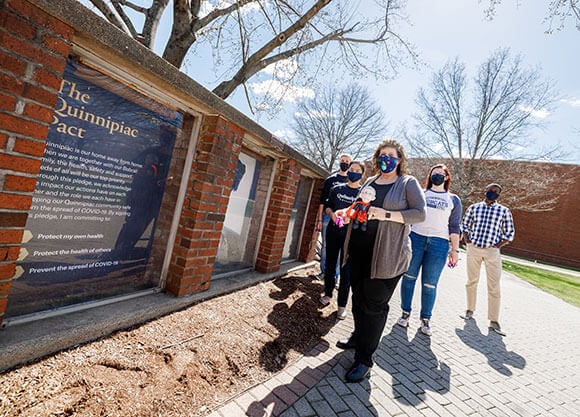
Graduate students present their research on vaccine hesitancy
November 01, 2021

November 01, 2021

Ashley Deveau ’21, MS ’22, and Bethany Hoschar, MS ’21, are both exploring the impacts misinformation has on vaccine hesitancy.
“Vaccine hesitancy has been increasing significantly over the past few decades, especially due to an increase in the spread of misinformation in the media,” said Hoschar. “In 2019, the World Health Organization named vaccine hesitancy as one of the top 10 threats to global public health. It is now a heavily researched topic as people try to learn ways to address the concerns that lead to hesitancy.”
Deveau, a molecular cell biology graduate student, focused her research on myths and misconceptions surrounding the influenza vaccine among college students.
Her presentation, “Influenza Vaccine Hesitancy Among Senior and Freshman Students,” evaluates the difference in vaccine hesitancy between students based on college year. Deveau also plans to research the difference in vaccine hesitancy between medical and non-medical students.
Hoschar is a master's student in the biomedical science program. Her presentation, “The Influence of Political Views on COVID-19 and Traditional Vaccine Attitudes,” is focused on the impact politics have on vaccine hesitancy.
“I am also working on my master's thesis with Dr. Cuchara, determining if there is a significant difference between vaccine views from pre-COVID to post-COVID,” Hoschar said.
Hoschar and Deveau both work with Lisa Cuchara, Ph.D., professor of biomedical sciences.
Cuchara runs a research group that includes five to 15 students per semester.
The students help collect data through distributing vaccine surveys and analyzing the information collected. Cuchara hopes that students will learn about the vast influences that impact vaccine hesitancy and misinformation.
“Each student in the group has a different focus, and most of the students present their research at a local research conference,” Hoschar said. “The vaccine survey generally stays the same to allow time comparisons, however, we did add COVID questions after the shutdowns began in 2020.”
Vaccine hesitancy is on the rise and this research group hopes to help understand the influences that are causing this trend.
“We want to ensure good public health, but to do that, we need to understand factors that influence a person's views on vaccination in order to understand how to curb any concerns about vaccination,” Hoschar said.
Cuchara and her students have a blog, where they post about their research regularly. The future goals of the research group are to share their blog with the public to provide a platform for the community to easily find scientifically accurate and researched resources. The goal of the group is to decrease the circulation of myths surrounding vaccines and help decrease the rate of vaccine hesitancy.
Quinnipiac Today is your source for what's happening throughout #BobcatNation. Sign up for our weekly email newsletter to be among the first to know about news, events and members of our Bobcat family who are making a positive difference in our world.
Sign Up Now